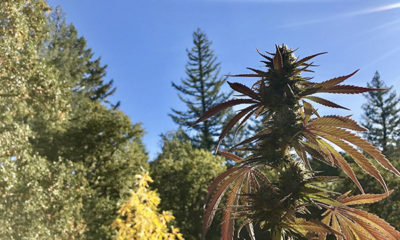
Joint Opinions
On Science and Ideology: Why the Feds Aren’t Going Far Enough On Cannabis Policy
Many Americans are excited about the federal bill to legalize medical cannabis nationwide. If passed, the Compassionate Access, Research Expansion and Respect States (CARERS) Act (S.683) would reschedule cannabis under the Controlled Substances Act (CSA) from a Schedule I to a Schedule II drug; allow the Veterans Affairs administration to recommend it to vets with PTSD and specifically exempt high-CBD, low-THC cannabis medicines from the CSA.
While the move is groundbreaking — never since federal prohibition on cannabis began has there been such an effort to end the war on cannabis — it doesn’t go far enough to actually follow science over ideology, as President Obama suggested on CNN’s Weed 3:
“You know, I think I’d have to take a look at the details [of the CARERS Act], but I’m on record as saying that not only do I think carefully prescribed medical use of marijuana may in fact be appropriate and we should follow the science as opposed to the ideology on this issue, but I’m also on record as saying that the more we treat some of these issues related to drug abuse from a public health model and not just from an incarceration model, the better off we’re going to be,” Obama said.
Patients everywhere continue to suffer and recreational users continue to get arrested every day. Policy reform should be sweeping and in-line with current science, not ideology. While local and national governments try to grasp the safety and efficacy of cannabis — to understand the science — real people still suffer from current policies guided by disproven ideology.
If President Obama was true to his statements about science rather than ideology leading policy, cannabis would be completely de-scheduled, all strains of cannabis — no matter the cannabinoid content — would be completely exempt from the CSA, veterans would be handed cannabis and studied while taking it and the entire drug scheduling system would come into question.
The idea that some drugs are “good” while others are “bad” is based an outdated belief system that scientific research has shown isn’t an accurate way to determine drug policy. This ideology, referred to by Richard DeGrandpre in the book The Cult of Pharmacology as “pharmacologicalism,” is the prevailing theory used to determine drug laws and enforcement. It’s an antiquated view that would be amusing if the policy it guided didn’t have such devastating, real life consequences.
“Technically speaking, pharmacologicalism, like racism, is an ideological system rooted in a set of assumptions that, although false and exaggerated, govern a whole range of perceptions, understandings, and actions,” DeGrandpre says. “Pharmacologicalism dictates that the moral status of a drug exists as a purely scientific question that can be documented and classified once and for all, not as a societal one that must be considered and reconsidered across time and place. Society, culture and history cannot be ignored.”
DeGrandpre argues that set and setting of drug use has just as much, if not more to do with how a drug’s use is perceived by the user and society as a whole. The idea that drugs have magical powers to control humans discounts every other factor of drug use such as personal experience, personal tolerance, location and reason for use.
Perceptions of the relative safety of pharmaceutical drugs versus the dangers of illegal drugs have shaped American use and consumption, leading to thousands of legal-drug overdose deaths due to pharmaceuticals. If real science and education were used to inform the public, rather than propaganda and ideology, countless American lives would be saved or positively impacted.
Perhaps no relic of ideologically-driven drug policy is more egregious than the drug scheduling system. There are five drug schedules, drugs in Schedule I are considered to be highly dangerous, addictive and have no accepted medical uses. Schedule V drugs are considered safe enough to buy over the counter. Some Schedule V drugs are easy to get, have no or few age restrictions on purchase and are actually pretty deadly.
Robo-tripping, or getting “high” on legal cough syrups containing the psychoactive ingredient dextromethorphan (DXM), actually kills people. A handful of teenagers and adolescents have died or been hospitalized drinking legal cough syrup to alter their state of mind. Robo-tripping is even glamorized in the media; some brands, like those favored by rappers to make “Sizzurp” or “Drank” (soda and cough syrup), are prescription-only but command black market prices of around $800 a bottle.
Schedule I drugs are actually making a major comeback for their once-accepted and now again recognized medical uses. Schedule I drugs include cannabis, LSD, MDMA (ecstasy) and peyote. Not only do these drugs happen to be pharmacologically safer than pretty much all of the rest of the lower-scheduled and legal drugs, there is now a growing body of science saying these illegal drugs could be the answer to pretty much every mental and physical condition or trauma a human being could possibly need relief from.
In particular, cannabis has the ability to treat a long and growing list of mental and physical conditions. Nobody dies of an overdose of cannabis and this is a known fact because humans have used the plant in various forms for over 10,000 years. Studies and statistics back those facts up, but ideology continues to dictate that cannabis be treated like a dangerous and deadly drug, despite all the evidence proving it otherwise.
If science led policy over ideology, cannabis would be GRAS: Generally Recognized As Safe. Real education for the public and institutional studies would be underway immediately and jails nationwide would open their doors and let the prisoners go.
If Obama was serious about treating addiction to drugs as a medical problem rather than a criminal one, he would be signing the pardons for federal prisoners serving mandatory minimums for producing, possessing or distributing cannabis. Luke Scarmazzo, a legal dispensary owner, is currently serving 20 years. Eddy Lepp, a legal farmer growing for patients, is serving 10 years. Luke and Eddy both followed the law of their home state of California, before cannabis became mainstream the way it has today. They aren’t alone — federal tax dollars pay to keep thousands political prisoners locked up every single day.
If science were to truly lead policy, high-CBD strains so low in THC they can be legally referred to as “hemp” would be exempt from the CSA alongside every other strain of cannabis. THC causes apoptosis, or programmed cell death, of cancerous cells. Even the Feds admitted recently that cannabis may cure cancer. The idea that THC is not medicinal is a farce even disproven by the FDA. Marinol (dronabinol) is a Schedule III drug made of isolated and synthesized THC and was approved for medical uses by the FDA almost 30 years ago, in 1986.
While CBD is a highly-effective medicine, it’s scientifically proven to be most effective in whole-plant formulations. Legislation favoring high-CBD cannabis over all other strains is based on bad ideology, not science.
The lure of ideology is strong and science is hard work, but with all the potential to heal bodies, minds and build strong diverse economies around all the uses of the cannabis plant, all Americans be demanding actual policy led by science, not ideology.
What do you think? Tell us in the comments below.






















